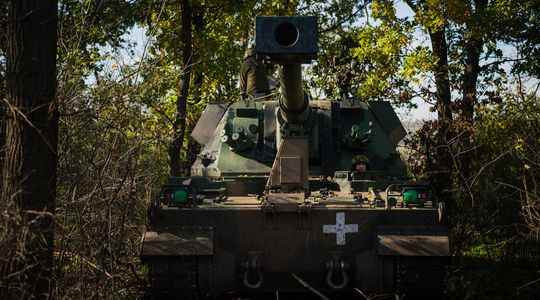After a series of defeats for its army on several fronts in Ukraine, Moscow has decided on a brutal change of strategy to try to reverse this spiral: massive strikes on Ukrainian electricity installations as winter approaches. “Since October 10, 30% of power plants have been destroyed, causing massive power outages across the country,” Ukrainian Head of State Volodymyr Zelensky said on Twitter. Ukraine has accused Russia of having mined a hydroelectric dam near Kherson, in the south of the country, with a view to causing a “catastrophe” in this region which it began to evacuate in the face of the advance of troops of kyiv.
- Ukraine accuses Russia of wanting to destroy a dam near Kherson
“Russia is consciously preparing the ground for a large-scale disaster in southern Ukraine”, denounced Volodymyr Zelensky, from a distance, before the Council of the European Union on Thursday.
According to him, the Russian forces “mined the dam and the units of the Kakhovka hydroelectric power station”, one of the largest infrastructures of this type in Ukraine. If the dam explodes, “more than 80 localities, including Kherson, will find themselves in the zone of rapid flooding,” he said. “It could destroy the water supply of a large part of southern Ukraine”, and affect the cooling of the reactors of the nuclear power plant in Zaporizhia, which draws its water from this artificial lake of 18 million cubic meters, added Volodymyr Zelensky.
- Explosions reported in Kharkiv
A series of explosions were reported in the city of Kharkiv in northeastern Ukraine, according to the British newspaper The Guardian. Kharkiv Mayor Igor Terekhov reported that many explosions were heard in the city early Friday morning. He said an administrative and production building in the area was hit.
- Faced with Russia, Finland wants its new iron curtain
More than 30 years after the end of the Cold War, Finland plans to erect tens of kilometers of fences and barbed wire on its border with Russia as a result of Moscow’s invasion of Ukraine. In full NATO membership, Prime Minister Sanna Marin announced this week that she has broad support in parliament to install high metal fences on 10 to 20% of her nearly 1,300 kilometer border with Russia. The project would amount to several hundred million euros.
Currently – and even in the days of the USSR – Finland has only meager existing wooden fences, mainly designed to prevent livestock from crossing the boundary. Helsinki now wants to build higher barriers, made of a solid mesh and topped with barbed wire running along a road. Officially to protect themselves from a scenario of migratory influx, as on the border between Belarus and the European Union last year.
- Energy: EU agreement on a “roadmap” which remains to be declined
The leaders of the European Union agreed overnight from Thursday to Friday on a “roadmap” aimed at putting in place, in the coming weeks, measures intended to stem the rise in energy prices .
The war in Ukraine and the sanctions imposed on Russia have caused a shock to the prices of oil, gas and electricity. But, since February, Europe has reacted slowly, weakened by the divergent interests of member states. If, after tough negotiations, the bloc wanted to present a united front, many points remain to be decided. And the negotiations in the coming weeks promise to be difficult.
- Putin’s martial law shows Ukrainians didn’t want to join Russia, Washington says
The establishment of martial law by Vladimir Putin in the annexed territories in Ukraine shows that the Ukrainians did not want to join Russia contrary to the assertions of the Russian president, said Thursday the spokesman for American diplomacy. “President Putin annexed those regions saying that there were people within those regions who were so desperate to flee the Ukrainian state that they wanted to join Russia,” Ned Price told reporters. “Now Putin is exposing this lie by introducing martial law.”
- Iranian soldiers in Crimea to help Russia?
Iranian military personnel are “on the ground in Crimea” assisting Russian forces in carrying out attacks using Iranian-made drones in Ukraine, the White House said Thursday. “Today we can confirm that Russian soldiers based in Crimea have piloted Iranian drones, using them to carry out strikes in Ukraine, including on Kyiv in recent days,” the National Security Council spokesman said. of the American presidency, John Kirby.
“We believe that Iranian military personnel were on the ground in Crimea and assisted Russia in these operations,” he added. “I don’t have the number of Iranians who are in Crimea,” he said, implying that they are still on the ground alongside Russian forces.
- Russia discusses with the ICRC for access to prisoners of war
Russia said on Thursday that the ICRC had permission to visit Olenivka prison, where dozens of Ukrainian prisoners of war died in unsolved circumstances in July, but that such visits were blocked by the security situation. . Since last week, Kyiv has accused the International Committee of the Red Cross (ICRC) of ‘inaction’ over Ukrainian prisoners held by Russia, and claims that the lack of visits puts prisoners at risk of torture .
The ICRC meanwhile said it shared the Ukrainian authorities’ frustration, but that such visits were only possible with authorization and security guarantees. The organization urged both sides to facilitate access to their prisoners of war and expressed particular concern over the lack of access to the Russian-controlled Olenivka prison in eastern Ukraine. .
